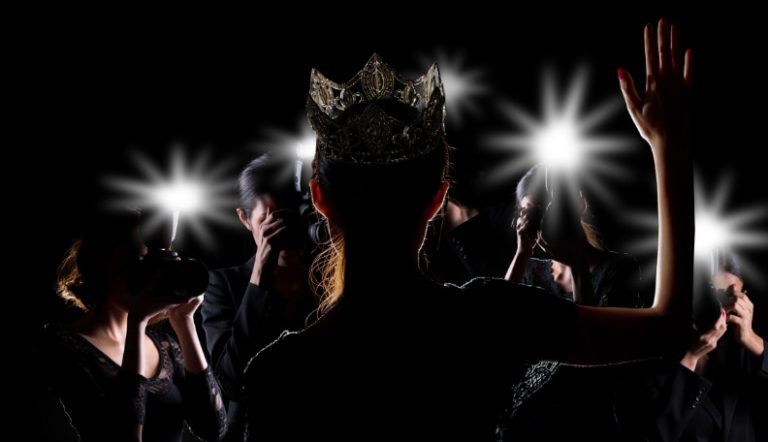Parasocial relationship is a one-sided relationship with someone who doesn’t even know they are in it with you. Pathological or beneficial?
Ah, parasocial relationships. They’re like the secret handshake you share with your favorite TV character, except they’re not in on the secret.
Ever caught yourself discussing your favorite celebrity’s love life like they were your college roommate? Ever yelled at the TV, giving advice to a fictional character, confident they’d hear you? Well, welcome to the fascinating world of parasocial relationships!
This connection we feel with stars and fictional characters is not as “out there” as you might think. In fact, it’s pretty common!
You know you’ve been there: talking to your screen as if Jon Snow from “Game of Thrones” could actually hear your wise counsel on dealing with White Walkers.
From a psychological perspective, these one-sided bonds or parasocial relationships are a normal part of our complex human emotions.
They’ve got the glitz, the glam, and the fun of being BFFs with a celebrity – all without the awkward moment when you realize they have no clue who you are.
What is Parasocial Relationship?
Parasocial relationships are one-sided psychological connections that people form with media figures such as celebrities, fictional characters, or social media influencers.
It might sound strange to have a relationship with someone who doesn’t even know you exist, but there’s serious science to explain why it happens.
The concept of parasocial relationships was first coined by Donald Horton and R. Richard Wohl in 1956 when they studied the illusory experience of a “face-to-face” relationship with performers on television.
Building upon this, Albert Bandura’s work on social cognitive theory illustrates how we model behaviors and attitudes from media figures. Just like you might feel connected to Oprah, even if you’ve never actually sipped tea together.
Attachment theory by John Bowlby offers another lens to understand this phenomenon. It explains why we might latch onto media figures, forming emotional connections that fulfill our social and emotional needs, similar to a child’s attachment to a caregiver.
This idea aligns with the Uses and Gratifications Approach, focusing on how we create parasocial relationships to fulfill certain needs, such as companionship, entertainment, or guidance.
How Platforms Deepen Parasocial Connections
In the age of social media, these relationships have evolved, blurring the lines between celebrity and fan. Modern studies, like those conducted by Dibble et al. (2016), reveal that platforms like Instagram and Twitter deepen these connections, making us feel like we’re practically part of a celebrity’s inner circle.
So, whether you find yourself relating to Coach Taylor from “Friday Night Lights” or sharing fashion tastes with Rihanna, these connections are more than mere flights of fancy.
[Read: The toxic dangers of social media & 19 signs and ways it makes you insecure]
They’re grounded in well-established psychological theories, making parasocial relationships a widespread and intriguing part of our media-saturated world. Here’s how social media platforms deepen parasocial connections:
1. Immediate Access
Social media gives us instant access to celebrities and media figures. It’s like having VIP backstage passes to their lives, 24/7, minus the security guards and velvet ropes.
2. Personal Insights
From breakfast selfies to workout videos, social media allows media figures to share personal aspects of their lives. You may know what your celebrity crush ate for breakfast before your own family!
3. Interactive Engagement
Ever received a “like” or reply from a celebrity? That simple interaction can deepen the parasocial connection. It’s like catching a guitar pick at a rock concert but without the bruise.
4. Virtual Companionship
With the frequent updates and live videos, a social media connection can feel very personal. Your favorite celebrity might become your daily coffee buddy—no coffee shop required!
5. Social Influence
Social media influencers often blend the line between friend and celebrity. Their recommendations and lifestyle choices may influence your own, just like a close friend might.
6. Impact on Self-Identity
The way we relate to social media figures can influence our self-identity, values, and even behaviors. It’s a modern-day mirror reflecting societal norms and trends.
7. Emotional Complexity
The digital connection adds layers of emotional complexity to parasocial relationships. Joy, envy, inspiration, disappointment—all wrapped up in your smartphone. [Read: Platonic crush, what it means and the 22 must-know pros and cons]
Why We Fall for People We’ve Never Met
Humans are social creatures. It’s in our nature to connect with others, even if those “others” are celebrities or fictional characters we’ve never met.
The psychology behind this attraction isn’t merely star-struck fantasy, it’s a reflection of fundamental human behavior.
One key concept to understand here is social cognitive theory. This theory highlights how we learn and model our behaviors, attitudes, and emotional reactions from observing others.
We see a famous person living a certain lifestyle or a fictional character embodying values we admire, and we’re drawn to them. It’s not about imitation as much as it’s about relating and understanding.
Take the example of a popular superhero like Spider-Man. Many fans feel a connection to Peter Parker not just because of his web-slinging acrobatics but because of his struggle with everyday problems like relationships and work.
It’s easy to relate to him, even though we’re not swinging through the cityscape ourselves.
This attraction to media figures also represents a very normal way of exploring our identity and values.
Consider the way teenagers might look up to a pop star who expresses themselves freely and confidently. It’s not about wanting to be that pop star but rather resonating with their self-expression and independence.
So why do we fall for people we’ve never met? It’s not a sign of being out of touch with reality. It’s a fascinating aspect of human psychology, showing how our minds can form connections, be influenced, and even find guidance and inspiration in the most unlikely places.
Whether it’s a movie star, a fictional wizard, or a sports legend, these connections are a natural part of what makes us human.
The Concerning Signs of a Parasocial Relationship
Parasocial relationships are complex, and understanding the signs can be a bit like unraveling a psychological mystery.
So what exactly marks the line between admiration and a parasocial attachment? Here’s the rundown:
1. Intense Emotional Connection
It’s normal to admire a celebrity or enjoy a fictional character, but parasocial relationships often involve deep emotional connections.
You might find yourself feeling genuinely happy or sad based on the events in that media figure’s life, even though you’ve never met them. [Read: Emotional connection: 38 signs, secrets & ways to build a real bond]
2. Illusion of a Reciprocal Relationship
While admiration is often a distant appreciation, a parasocial relationship may include a belief that the celebrity or character knows and understands you.
You might find yourself talking to them in your mind or feeling that they would be your friend if you met in real life.
3. Interference with Real-Life Relationships
Unlike mere admiration, parasocial attachments might start to affect your daily life.
Maybe you’re planning your schedule around a TV show or letting a celebrity’s opinions heavily influence your decisions.
4. Extensive Time and Energy Investment
We all have favorite stars or characters, but a parasocial relationship often includes an extensive investment of time and energy.
This might mean following their every social media post or investing emotionally in their personal life.
5. Filling a Social Void
Sometimes, a parasocial relationship can step in to fill a social void. This isn’t necessarily a negative thing but could indicate a deeper emotional connection than simple admiration.
Admiration vs. Parasocial Attachment
Admiration and Parasocial Attachment might seem to be on the same spectrum, but they have distinctive characteristics that set them apart.
Admiration
Admiration is that warm, glowing sensation you feel when someone’s talents, achievements, or qualities strike a chord with you.
It’s like giving a standing ovation in your mind, appreciating what you see but without necessarily wanting to become best friends or share a virtual coffee.
Think of it as cheering for your favorite athlete but not expecting a post-game chat over dinner. It’s respect from a distance, a tip of the hat to excellence, served with a side of inspiration but without extra emotional toppings.
1. Respect and Appreciation
Admiration often involves genuine respect and appreciation for a person’s talents, values, or accomplishments. You might admire an athlete for their dedication or an actor for their craft.
[Read: 28 signs someone has a secret crush on you & is trying to hide it]
2. Distant Connection
While you may feel a connection to the person you admire, it’s typically more distant and lacks the intimacy of a parasocial relationship.
3. Limited Impact on Daily Life
Admiration might inspire or motivate you, but it usually doesn’t consume large parts of your daily life or emotional energy.
4. Awareness of Separation
Even when you strongly admire someone, there’s generally a clear understanding that the person doesn’t know you personally or share a reciprocal relationship.
Parasocial Attachment
On the other hand, parasocial attachment takes admiration a step further and enters the territory of a perceived connection or relationship with a media figure or celebrity.
Unlike admiration, where the feelings might be more surface-level and distant, parasocial attachment involves a deeper emotional investment.
This connection often goes beyond mere appreciation of a person’s talents or qualities and extends into a feeling of friendship or intimacy.
It can include following their daily lives, feeling empathy for them, and sometimes even imagining interactions with them.
While it may sound unconventional, parasocial attachment is a normal aspect of modern media consumption and reflects the human desire for connection and companionship.
1. Deep Emotional Connection
Parasocial attachment transcends admiration by forming a deeper emotional connection. You might feel joy, sadness, or even a sense of friendship with the media figure.
[Read: Emotional connection: 38 signs, secrets & ways to build a real bond]
2. Illusion of Reciprocity
Unlike admiration, a parasocial relationship often comes with a belief in a two-way connection. You might feel as though the celebrity understands you or would be your friend if you met.
3. Potential Interference with Life
A parasocial attachment can become intense enough to influence your daily decisions, relationships, or even self-perception.
4. Filling Emotional Needs
Parasocial relationships might fulfill emotional or social needs, going beyond mere admiration to become a part of your emotional support system.
The Good and Bad When Your TV BFFs Feel Like Family
When your TV BFFs feel like family, you’re experiencing something quite extraordinary. This unique connection to fictional characters can be a double-edged sword.
While it brings warmth and companionship into your living room, it might also create complexities that need careful navigation. Curious to know more?
The Positive Side: A Virtual Hug
Embracing a media character like a virtual friend can feel like receiving a warm hug from your TV screen.
This connection goes beyond mere entertainment, it resonates on an emotional level, providing companionship and even boosting self-esteem.
Let’s explore how these virtual relationships can add a comforting layer to our lives.
1. Increased Self-Esteem
Sometimes, connecting with a media figure who embodies qualities you admire or relate to can boost your self-esteem. It’s like having a mentor or role model cheering you on from the screen.
[Read: How to build self-esteem & love life with 10 simple life changes]
2. Companionship
Feeling alone on a Saturday night? Your favorite TV characters are always there for a binge-watch session. This virtual companionship can provide comfort and reduce feelings of loneliness.
3. Learning and Growth
Believe it or not, fictional characters can teach us about ourselves and the world.
Whether it’s learning empathy from a compassionate character or gaining insights into different cultures, these connections can lead to personal growth.
4. Emotional Outlet
Sometimes, getting lost in a fictional world allows you to process real-life emotions. A good cry over a TV drama might be just what the psychologist ordered!
The Negative Side: Beware the Screen Sirens
Beware the screen sirens, not all that glitters on the TV screen is gold. While the connection with media figures can provide joy and comfort, there’s a side that calls for caution.
The line between admiration and over-attachment can blur, leading to unrealistic expectations and potential interference with real-life relationships.
1. Over-Attachment
There’s loving a TV show, and then there’s planning your life around it. An over-attachment can lead to neglecting real-life responsibilities or relationships. [Read: Insecure attachment: what it is, types, 23 signs & how it affects your life]
2. Unrealistic Expectations
Expecting real-life friends to behave like TV characters can lead to disappointment and misunderstandings. Remember, even the best TV friends have scriptwriters!
3. Potential Escapism
While escapism can be healthy in moderation, relying too much on fictional worlds might prevent you from facing real-life challenges or emotions.
4. Impact on Social Perception
Over-identification with fictional characters may sometimes skew your perception of social norms or acceptable behaviors, leading to potential misunderstandings in real-life interactions.
When to Be Worried About a Parasocial Relationship
Parasocial relationships are a natural part of human interaction with media, but like any relationship, they can become unhealthy. Here’s when you might want to take a step back and evaluate:
1. Obsessive Behavior
Are you constantly checking a celebrity’s social media, or do you feel a compulsive need to know everything about a fictional character? Obsession might indicate an unhealthy attachment. [Read: Obsessive love disorder: what causes it, 21 signs & how to get over it]
2. Neglecting Personal Relationships
If you find that your connection to a media figure is causing you to neglect friendships, family, or romantic relationships, it’s time to take notice.
3. Emotional Dependency
It’s normal to feel connected to media figures, but if their actions or words begin to heavily impact your mood or emotional well-being, this could signal a problem.
4. Blurring of Reality and Fantasy
When the line between the media figure and real life becomes too blurred, such as feeling that a fictional character is truly your friend, this might signify an unhealthy attachment.
5. Time and Attention
Spending excessive time and attention on a media figure can lead to neglecting real-life relationships, causing tension and disconnect with loved ones.
6. Unrealistic Expectations
Sometimes, an intense parasocial relationship can create unrealistic expectations in real-life relationships, making it challenging to connect authentically with those around you.
7. Impaired Social Functioning
In extreme cases, a parasocial relationship might interfere with your ability to function in social settings, hindering your ability to form or maintain connections with real people.
Tips for People Struggling in a Parasocial Relationship
If you’re struggling with a parasocial relationship, your celebrity crush doesn’t have to become your life coach.
Here’s some practical, empathetic guidance, delivered with just the right amount of humor to keep things light:
1. Set Boundaries
Love watching every interview of your favorite star? That’s fine, but maybe don’t let them dictate your hairstyle, diet, and sleep schedule. It’s like a diet—everything in moderation!
[Read: 25 types, ways & tips to set boundaries with friends without insulting them]
2. Balance Real-Life Connections
Remember those people called friends and family? They’re the ones who don’t live inside your TV or smartphone.
Spending time with them can create balance and keep your parasocial attachments in check.
3. Reflect on the Attraction
Take a moment to analyze what draws you to this celebrity or character. Understanding the underlying appeal can provide insights into your own needs and values.
Just don’t turn it into a doctoral thesis!
4. Create a ‘Celebrity-Free’ Zone
Allocate time where you consciously choose to engage with other hobbies or interests. Think of it as a celebrity detox—refreshing and rejuvenating!
5. Seek Professional Help if Needed
If the attachment feels overwhelming, don’t hesitate to reach out to a mental health professional. They’re like personal trainers for your mind, minus the sweat and gym fees.
6. Remember, They’re Only Human *or Animated!*
Celebrities, even animated ones, have flaws and are often portrayed in an idealized manner. Keeping this in mind can help maintain a realistic perspective.
After all, even superheroes need to do laundry!
Embrace the Fandom, but Keep It Real
Isn’t it quite something to discover that the world of parasocial relationships is as layered and intriguing as a blockbuster movie plot?
Parasocial relationships may be as common as questionable fashion trends, but understanding their complexities can make for a rewarding and balanced connection with your favorite media figures.
So go ahead, celebrate your love for that TV character or pop star, but don’t forget to keep it real with the folks who know you best.
And speaking of keeping it real, we think it’s time for you to switch from this engaging exploration of parasocial relationships and check in with your actual friends.
Don’t worry, your celebrity crush won’t mind. Or will they?
P.S. Your celebrity BFFs will still be there when you get back, probably enjoying the same virtual party with countless others exploring the intriguing world of parasocial relationships.
Liked what you just read? Follow us on Instagram Facebook Twitter Pinterest and we promise, we’ll be your lucky charm to a beautiful love life.






0 Comments